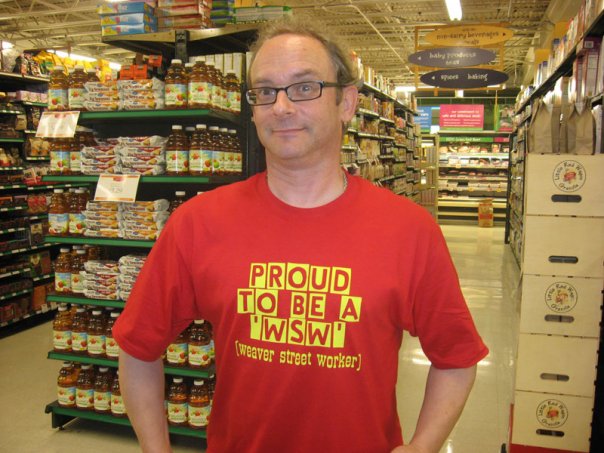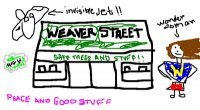 The Co-operative Grocer this month [http://tinyurl.com/ycwmxkk] confirms that Weaver Street Market Co-operative has had to be bailed out by the national co-operative movement to prevent bankruptcy, following its ill-fated expansion program – an expansion program which has left The Weave with $10 million in long-term debt and an ongoing annual debt interest charge of $1 million.
The Co-operative Grocer this month [http://tinyurl.com/ycwmxkk] confirms that Weaver Street Market Co-operative has had to be bailed out by the national co-operative movement to prevent bankruptcy, following its ill-fated expansion program – an expansion program which has left The Weave with $10 million in long-term debt and an ongoing annual debt interest charge of $1 million.Before making suggestions as to how to deal with that crippling $1 million a year debt interest charge, let me first address the article itself, and the unfortunate fact that those responsible for it seemed to be more engrossed with patting themselves on the back for a job well done, rather than paying thanks to the folks who are actually saving the co-op – namely, its workers.
As a consequence of that omission, I wrote a short letter to Dave Gutknecht, the Editor of Co-operative Grocer, and he has very kindly agreed to publish it in the next (May-June) issue:
“Dear Dave,
I commend the Co-operative Grocer for its coverage of the troubles flowing from the significant expansion being undertaken by Weaver Street Market, and the response of the wider co-operative movement to the consequential financial problems.
It takes a rare individual, like our General Manager, to allow such public airing of the difficulties associated with a project in which he has invested so much of his time and authority.
And, of course, I am one of many workers in our rather unique worker-consumer grocery co-operative who remains deeply grateful to all those in the national co-operative movement who have so selflessly agreed to fill the breach in our finances.
Yet, I was disappointed by what I felt was insufficient reference in your article to the fact that the imbalance in our accounts (created by expansion) has been overcome not only by the short-term generosity of other co-operatives, but also by the hard work and magnanimous self-sacrifice of every worker in WSM.
It is no secret that our workers have had serious misgivings about the expansion program, both during its conception and its implementation, not least the timing, the scope and now, the sustainability of the long-term debt ($10 million).
Yet, each and every worker has responded magnificently and selflessly, both to the drop in sales resulting from the disruption to consumers, and to the weight of the debt service charge ($1 million).
We have accepted reductions in the hours for which we are paid. We have foregone pay raises. We have gone without a worker-owner dividend for two years now. And we have been the ones on the front line with customers explaining all the changes to those exasperated consumers.
It is not just the Food House which caused the labor savings you quote in your article. It is the contribution of every ordinary worker on the sales floor, in the production departments and in the corporate office, all of whom have been working harder for less these past two years in order to keep our co-operative afloat.
The underlying theme of co-operation is democracy. I do not think I am out of place suggesting that the exercise of democracy in your co-operative journalism might have seen you interview an ordinary worker or two in our co-operative, rather than just the most senior management, in order to get the fullest picture of the effort underway to restore balance to WSM’s financial outlook.
Yours in co-operation,
Geoff Gilson”
Of course, WSM wouldn’t need to owe a debt of gratitude to its workers for all their sacrifices, nor be asking them to make even more improvements in sales and productivity (as, indeed, it continues to do – http://tinyurl.com/yh8ouet or http://tinyurl.com/yj6ga43), were it not for WSM’s huge debt of $10 million (resulting from WSM’s ambitious expansion program) and the continuing annual debt interest charge of $1 million.
Does WSM’s Debt Really Matter?
Yes.
1) It puts a 5% Silent Tax on every sale that we make. If it was important enough that we remove the consumer discounts in 2009 because they added 5% to every sale, then it should be just as important to remove the 5% Silent Tax [http://tinyurl.com/yhsyjpw and http://tinyurl.com/ylo2ynj].
5% Silent Tax? Yes. We have a turnover of about $25 million. The annual debt interest charge is $1 million. That works out at about 4-5% on each and every sale that we make.
2) By having to pay out $1 million in debt interest each and every year, that is $1 million WSM does not have to improve food quality; renovate the stores (which is why the corporate office and the Board are now planning to borrow yet more money to upgrade the Carrboro store); restore worker hours; nor give workers pay raises and their long overdue dividends.
3) We workers are having to work ever harder, without any sort of financial incentive, or even the opportunity to query the demands being made of us (as is required by our co-op’s Mission Statement and Decision-Making Process). And this is not because of the recession. Nor because of competition from the likes of Trader Joe’s. But simply because we continue to have to pay that $1 million in debt interest each and every year.
There is only so much that WSM can realistically continue to demand. Workers are performing at their top productivity right now. We are as stressed as we can be. What more can we possibly do? Sure as heck, we can’t go on finding another $1 million in extra sales and productivity – every single year. I mean, you can only smile so wide.
The only realistic way to go on improving sales and productivity is to increase investment in product provision and quality and customer service. But WSM has tragically limited itself in what it can do in that regard, precisely because it has to use $1 million a year to go on paying that interest on the debt. It is a vicious, unsustainable and ever-decreasing circle. It would be a Monty Python sketch – if it wasn’t so serious.
4) Finally, there is not one penny of that $1 million annual debt interest payment that stays in our local economy. By continuing to maintain our current level of debt – with out-of-town banks – we are literally bleeding $1 million a year out of our local economy.
What Can We Do About The $1 Million Annual Debt Interest Charge?
Look. I will continue to do all that I can to be as productive as I can. I love my co-op and do not want it to fail. But if I am to go on improving my productivity in the face of almost impossible odds, then isn’t it time that the corporate office and the Board of Directors (that is supposed to monitor that office) did their part to improve their own productivity? Which means doing all they can to get rid of that $1 million a year in bank interest?
At the WSM Annual Meeting two years ago, I predicted that our annual interest charge would rise to $1.5 million a year by 2013, at the latest [http://tinyurl.com/yze9xju and http://tinyurl.com/ylqp6nl]. I suggested to that Meeting of WSM’s owners that we set up an Owners’ Task Force to conduct a thorough risk assessment of all of the long-term debt, and make recommendations as to how to reduce it, without losing the benefits of and the jobs at the Food House and the new Hillsborough store.
The Annual Meeting supported my suggestion. But the following Board meeting refused to set up the Task Force, saying that it was not necessary. Leaving us with the debt unchanged, and we workers (on our own) having to find ways to pay that $1 million a year of debt interest.
And also – let’s get this very clear – and also, leaving the Food House and the Hillsborough store at risk. If WSM defaults on its loans (as this article says we almost did in 2008), then the Food House and the Hillsborough store (and their jobs) will be the first to go.
Now, it may well be that the corporate office and the Board of Directors are undertaking steps, even as I write this note, massively to reduce WSM’s debt and its burden on we workers. But if there is such a plan, they aren’t telling us. And we have a right to know.
Since we are not being told about any such plan to reduce the $10 million in long-term debt, I think it safe to assume that, for whatever reasons, there isn’t such a plan. Which brings us back to square one – there needs to be one.
Anyone who understands business knows that you cannot get every decision right the whole time. But, what you do when you realize that circumstances have changed is to review and adapt.
I’m not saying that the original rationale for the Food House and the Hillsborough store was right or wrong. What I’m wondering is this: can we any longer sustain the financial consequences of that original rationale (i.e. the $ 10 million long-term debt), without making major changes to the underlying game-plan?
Maybe we can. Maybe we can’t. But, doesn’t it make sense that we at least undertake a thorough and open review of the game-plan, to see how best we can reduce the debt, while saving what we can of the benefits of and the jobs at the Food House and the Hillsborough store?
And then letting the WHOLE co-op (owners, consumers and workers together) make the decisions that are necessary to give effect to the changes to the game-plan?
Indeed, looking to the future, doesn’t it make sense that the owners and workers of WSM demand of the Board of Directors that they introduce the systems and structures necessary to allow owners and workers to control all strategic decision-making from now on (as promised by the ICA Co-operative Values to which we subscribe and which we enunciate on the front page of every one of our store newsletters), so that we never again find ourselves having to go cap in hand to the national co-operative movement to bail us out? [http://tinyurl.com/yhbp76o and http://tinyurl.com/mnbp2y]
In the meantime, WSM cannot go on as it is. We cannot go on borrowing to pay our existing $10 million debt and $1 million annual debt interest charge. Nor getting bailed out by the national co-operative community. Nor making impossible demands of our workers. And sure as night follows day, we cannot borrow any more money.
Sooner, rather than later, we are going to have to change our game-plan and reduce that debt. Before the banks who own that debt do the changing for us.
Proud To Be A Weaver Street Worker
I remain the eternal optimist. I wouldn’t still be here, busting butt and advocating my ass off if I wasn’t.
I believe that we can achieve anything in our co-op with the right people, the right attitude and the right decisions being made.
But I also believe that ‘co-operative’ is a verb: to co-operate. And co-operation in a co-op should work both ways.
If we workers are to become ever more productive, then it is time that WSM’s corporate office and Board of Directors worked just as hard at improving their productivity. Reviewing the co-op’s game-plan – and including owners and workers in that review. And then reducing the debt.
If we were to free ourselves from our debt, and take the necessary steps to place owners and workers in control of the strategic decision-making within our co-op, then I believe we would overcome our difficulties (on our own!); we’d become a stronger business and a better co-op as a result – AND we’d be a happier place all round!
Remember, it is happy workers who make for happy customers…























